Prior to 2018, it was rare for me to read books. Sometimes I tried, but I would quickly get bored and put the book aside. For 2018 I set a new years resolution of reading more books, with no set number in mind. This page is a compilation of those books, and some of my experiences with them.
This book list is heavily drawn from Hacker News’ recommended books. In relation to the greater set of recommended books on Hacker News, this set is light on Sci-Fi, so if you’re into that, go check out some of the other books people have recommended. Additionally, the list is mostly untechnical to keep it generalized. Eventually I will revisit the old Hacker News posts and see which recommenders’ opinions I got the most value from, and I will check out their other recommendations.
If you are also looking for recommended books on Hacker News, feel free to use my Goodreads profile to add many of these books to your own lists. The Goodreads list will have actual ratings for each book too, which I don’t do here.
Books of 2018
Currently Reading
Les Misérables
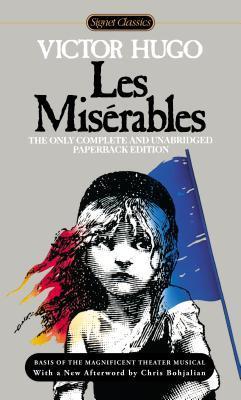
Annoying enough to inspire. After picking it up and putting it down twice, and finally picking it up again, I felt an urgency to build a website to help readers make better decisions about what they should or shouldn’t spend their time reading. The site allows readers to review books on a chapter-by-chapter basis. I started this book and had to put it down because it felt so slow and uninteresting at first. I thought a tool would be useful if you could see a graph showing, hey, 80% of readers thought the book bored them to death for the first three chapters, but then 100% of readers thought the entire rest of the book was engaging! Seriously though, we read other people’s reviews and they usually cover the entire book. How is anyone supposed to know when it picks up, if ever? For all we know, we just have different taste, and they loved the first 50 pages while we.. did not. Anyway, I am currently 451 pages in and I find it enjoyable, albeit still a beast. I’ll update when finished. In the meantime, I started reading a smaller book, Masters of Doom, so that I can make more of my time. Oh, and this has been a valuable lesson. Don’t feel confined into reading only one book at a time. You won’t always be in the mood for the one, but you might be in the mood for the other. If you fear not being able to keep up with everything, I imagine you watch more than one show at any time, which is comparable.
The Master Switch: The Rise and Fall of Information Empires
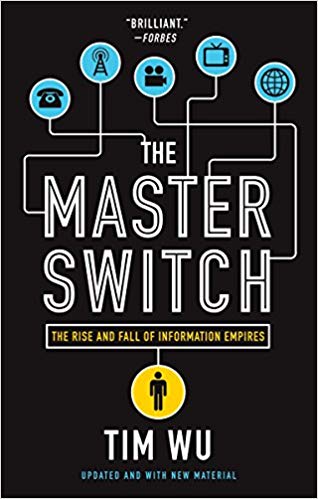
Having already started Darwin’s Origin of Species and Tolkien’s The Silmarillion, while reading Impro, I really was not trying to start another book. But I did, and it has been hard to put down. It’s been a pleasant surprise. Typically the history of technology bores me. Industrial and corporate warfare, luck, chaos, politics—these factors all make the history of information technologies in this book engaging and perhaps more importantly, memorable. If not for the gained perspectives on information empires, this knowledge will at least serve conversation.
The Master Switch: The Rise and Fall of Information Empires
The Origin of Species
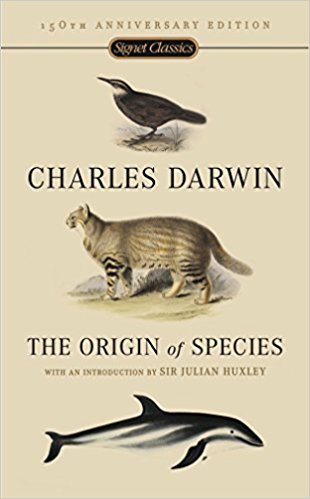
Tough read. Since I am reading The Silmarillion, which covers the creation of the universe for The Hobbit and The Lord of the Rings, I thought some evolutionary theory could be applied, so I wanted to read The Origin of Species simultaneously so that I could draw some bridges between the two. It has proven difficult. I will update if I find any goodies.
The Silmarillion
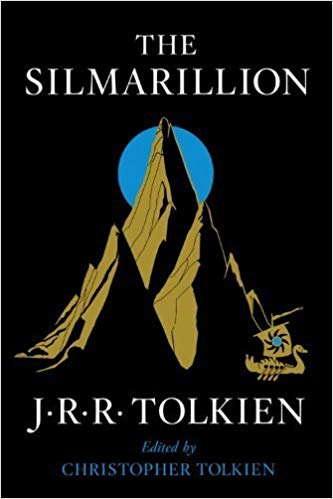
You will see comparisons to the bible, then disagreement in that the book more closely parallels a history book. They are all accurate, but it’s worth saying that this book is generally more readable than the bible, or most history books. Other conversation generally revolves around order of reading for the J.R.R. Tolkien books. Having watched the movies and not read any of the books, starting with The Silmarilion before The Hobbit and The Lord of the Rings has been perfectly fine. All of my current knowledge of the universe is being contextualized, which makes it all super engaging. It’s really a must-read since it adds so much value to all of the other stories that we already like so much.
Finished Reading
The Righteous Mind: Why Good People are Divided by Politics and Religion
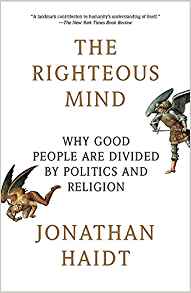
This book offers a framework for viewing day-to-day moral conversations, and by extension, an approach for engaging in these conversations. It spends a lot of time—what some would consider—sympathizing with the other party’s viewpoints and rationale, which I’m sure frustrates many readers. However, I believe that in being able to frame another’s argument in a positive way (rather than in a negative, contrary-to-my-view way), I have been able to communicate more effectively. The book notes that it’s better to be kind and to introduce a thought/feeling, and let that seed grow into something on its own, or to solely introduce a perspective so that it at least becomes a possibility. This isn’t an earth-shattering revelation; we know the backfire effect is real, and that it is often futile to directly just say that somebody is wrong and attack with what we consider to be rationale and logic. The author uses an elephant-rider metaphor that is helpful in articulating this idea of appealing to feelings and intuition rather than reason.
The worst reviews on Amazon cite the author’s bias, and claim the author is a republican masquerading as a democrat, and there seems to be some truth to that, but I don’t think it takes away from the book’s message, or all of the studies that back that message. The author claims that liberals only have a couple of primary points that they care about, while conservatives value all six ‘moral foundations,’ and some readers tend to act as if he is opinionated about this fact, that he acts as if it makes conservatives superior in some way, but I never got that feeling. It’s possible that I missed something, but it’s also possible that people were feeling attacked and rationalized it afterward. Ironic, if that’s the case.
I recommend reading the book. Debate and conflicting sides probably are signs of a healthy society, but given how polarized everyone has become, I’m sure it would be helpful to use a tool like this to help us see the other might not be so monstrous.
The Righteous Mind: Why Good People are Divided by Politics and Religion
Neverwhere
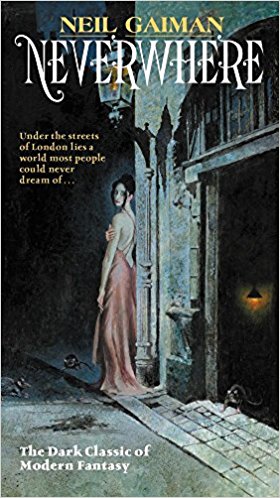
This is the first novel that I’ve read in a very long time, and I chose it because it seemed both intriguing and manageable. The two main characters felt flat, but I have to wonder if this was intentional, and common. For random example, the LOTR trilogy’s Frodo Baggins isn’t all that interesting, yet he frequently comes into contact with people like Smeagle and Gandalf. Maybe when the reader can better relate to the protagonist, the fantasy surrounding the character becomes more meaningful. Anyway, Mister Vandemar, Mister Croup, and De Caraba were thrilling to read about, and I think they will set the bar for my expectations of characters in the future. This is a great starter book.
The Count of Monte Cristo

The Count of Monte Cristo is am ambitious book for anyone with a horrible reading record. But it’s worth the shot, as it’s incredibly fun to read. I have a hunch that it appeals to the more materialistic parts of ourselves, but this isn’t so evident that it distracts from the story. Just read it. Live a little, and read it aloud too. Express different voices. But it’s a children’s book, you say? It’s got torture, romance, and every theme in-between. Children also read Beowulf and other serious, graphic texts. Who cares? It’s not like you would dismiss Dr. Seuss.
Meditations

My most recommended book. I found this book to be intriguing because it reads more like a journal, somebody trying to convince themselves to think about life with a certain framework, consistently hammering it in. This framework involves how we see time, life, death, and what it means to be a person. This is one of those times that you can respect the repetition since it is so effective. The book is a short and nonlinear read, you can pick it up and flip to any page, read any paragraph, and you’ll find yourself less stressed, and more content. When purchasing or renting the book, note that there will be different translations. I read Martin Hammond’s translation.
Heart of Darkness

What an exhausting book. It’s like 100 pages, but you will read each paragraph multiple times, and you will be left feeling like you aren’t making any progress. Unless you’re a seasoned reader I guess. I will have to come back to this one when I have the mental stamina. This experience, it just didn’t seem as beautiful as other readers made it out to be. Maybe I’ll get there though.
Escape from Colditz
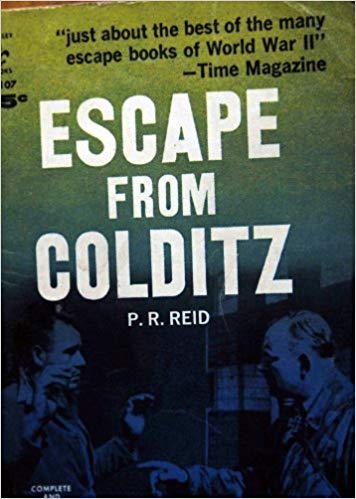
Most of these books, I have picked because of my own personal interest. I would never have chosen this book on my own accord. A close friend gifted it to me, and thankfully so. This is an inspiring book about WWII POWs. I never realized that escape attempts were so common. Colditz was a maximum security castle where escapers of other prisons were sent after recapture. Naturally, when you gather people with these wits and levels of determination, there will be great, collaborative attempts at escape. The story parallels that of Hacker culture in general. If you liked Hackers and Heroes, you will likely enjoy this book too. Testing authority, picking locks, finding social exploits, and even resourcefulness in building a brewery of makeshift parts. Again, this is a very inspiring story, packed with ingenuity and gall.
A Tale of Two Cities
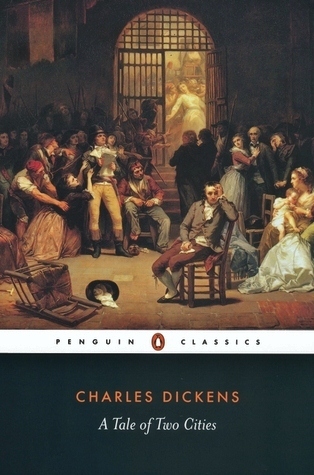
If I had tried to read this a couple of years ago, I would have put it down too early. The first third of the book was boring, but it picked up. I’d consider it a good test of my new year’s resolution to exercise more discipline. Anyway, this book revealed the power of building a context between a set of books. I read this after The Count of Monte Cristo (not immediately after), and I am currently reading Les Misérables, and collectively these books paint a more valuable picture of France around the time of the French revolution. It’s almost like the world-building in fantasy series, where you can imagine all of these things happening concurrently.
Masters of Doom: How Two Guys Created an Empire and Transformed Pop Culture

I couldn’t put the book down. Only a small subset of media can really take me back to the memories I had with my biological father before he passed. For music, the songs What I Got, Enter Sandman, No Rain, and Freak on a Leash. For games, Quake, Twisted Metal, and yes, Doom. Doom is one of those first experiences that I can live over and over again. I vividly remember sitting in the basement, playing it on that old PC running Windows 95. So it’s really cool to read about its inception. How it’s the product of developers iteratively building their talent and inventing new technology through smaller, lesser projects. It’s exciting because you know the outcome, and you can see the ideas creeping into what they were to become as you read about their various endeavors. The chemistry and passion these developers had for their creative pursuits is something out of this world, like that feeling of losing hours or days of time because you’re so caught up in building something you truly care about. I love stories like this. We can all only hope to find another person or group to challenge us to become better.
Masters of Doom: How Two Guys Created an Empire and Transformed Pop Culture
Creativity, Inc.: Overcoming the Unseen Forces That Stand in the Way of True Inspiration

I finished the Doom book. It left me wanting to read more about the passionate pursuits of others. Pixar fits perfectly. Like Doom, Pixar’s main people were on the bleeding edge of computer graphics technology, even involving themselves with texture mapping. Some points in Masters of Doom were implicit, like the effects that the working environment has on creativity. These are explicated in Creativity, Inc. as it’s a little more manager-oriented. There are numerous insights about how to facilitate and engineer creativity. A managerial book, but also historical and documentarian. Pixar is awesome, so really it’s just a fascinating read. Until now, I had no idea that George Lucas and Steve Jobs played important roles in shaping Pixar.
Creativity, Inc.: Overcoming the Unseen Forces That Stand in the Way of True Inspiration
Letters from a Stoic
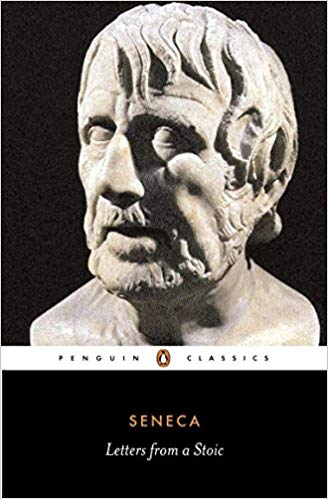
Hacker News recommends Seneca quite a bit. Having spent a little while looking for On the Shortness of Life, just as I was turning around to go to the checkout line of the bookstore, my eye caught the cover of Letters from a Stoic. I can appreciate the context of the letters and Seneca’s relationship with Lucilius, and much of the book is thought-provoking, but I found myself frequently disagreeing with Seneca. Too bad he and I can’t have a discussion.
Winesburg, Ohio

Meh. I don’t particularly feel comfortable rating the book poorly simply because I expected more from it at the time of reading. It does have the interesting value of painting people’s lives simplistically, as high-level, bare-bones skeletons. It allowed me to look at my own life in the same trivial way, similar to looking at earth from the moon and finding a certain clarity to life and its trivialities. And amusingly, I feel like I do know some of these characters in real life. That said, I don’t get why it’s so well-renowned. If you’re interested, you might as well give it a read since it’s somewhere around 100 pages.
Impro: Improvisation and the Theatre
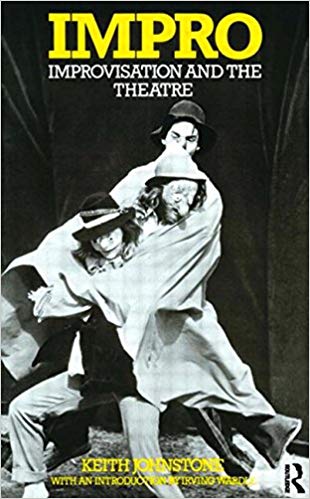
This book seemed interesting to me because I admire those that are quick-witted and come up with creative retorts to any prompt. I felt deficient in these skills and wanted to improve. Reading this book can help, I think.
The theory in the book will make you more conscious of your behavior. You will become aware of the fact that when you are first prompted, you do have a first thought that comes to mind, but out of fear you will hold off on that response, and essentially come up with something more boring and ‘acceptable.’ Becoming cognizant of this will make it easier to change the behavior, to actually acknowledge and use the gut responses. But this is a slow process. Slow like habit-building. Slow like recovering from a childhood of being an outcast. It is basically a new muscle that has never been used—though Keith Johnstone would probably say that the muscle has always been there, it just severely atrophied over time with the help of bad teachers. It will take some exercise. Which brings me to the next point. The theory, which encompasses much more than I just shared, is supplemented by a lot of group-based games. If you have a spouse or good friend that would be interested in playing some of the games with you, it would be useful.
Impro: Improvisation and the Theatre
Want to Read
- TaoTeChing
- The Power Broker: Robert Moses and the Fall of New York
- The Hobbit
- The Lord of the Rings
- The Silmarillion
- Sapiens: A Brief History of Humankind
- Labyrinths: Selected Stories and Other Writings
- The Zen Teaching of Huang Po: On the Transmission of Mind
- Bad Blood: Secrets and Lies in a Silicon Valley Startup
- The Art of Electronics
- Panchinko
- Mindstorms: Children, Computers, and Powerful Ideas
- This Craft of Verse
- Surely You’re Joking, Mr. Feynman!: Adventures of a Curious Character
- The Man Without Qualities
- On the Shortness of Life
- Life: A User’s Manual
- On Complexity
- The Cuckoo’s Egg: Tracking a Spy Through the Maze of Computer Espionage
- The Gulag Archipelago
- The Death of Virgil
- Either/Or: A Fragment of Life
- Too Loud a Solitude
- Pilgrim at Tinker Creek
- War and Peace
- The Toilers of the Sea
- The Divine Comedy
- Mason & Dixon
- Being and Time
- The Origin of Species
- Dark Continent: Europe’s Twentieth Century
- Understanding Comics: The Invisible Art
- Ghost in the Wires: My Adventures as the World’s Most Wanted Hacker
- Napoleon’s Buttons: How 17 Molecules Changed History
- The Master Switch: The Rise and Fall of Information Empires
- The Autobiography of Benjamin Franklin
- The Square and the Tower: Networks and Power, from the Freemasons to Facebook
- Bomber Command
- The Making of the Atomic Bomb
- Animal Behavior: An Evolutionary Approach
- Mostly Harmless Econometrics: An Empiricist’s Companion
- Other Minds: The Octopus, the Sea, and the Deep Origins of Consciousness
- Seeing Like a State: How Certain Schemes to Improve the Human Condition Have Failed
- A More Beautiful Question: The Power of Inquiry to Spark Breakthrough Ideas
- The Theory of Industrial Organization
- Marketing Management
- Real Analysis: A Long-Form Mathematics Textbook
- Who Is Fourier? a Mathematical Adventure
- The Soul of an Octopus: A Surprising Exploration Into the Wonder of Consciousness
Help..